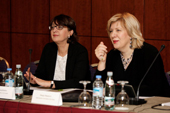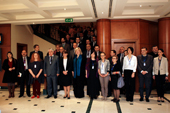
Georgia celebrates the 10th anniversary of South Caucasus Media
By Tatia Megeneishvili
Tuesday, November 12
A conference reflecting on OSCE media freedom commitments was held in Tbilisi on Monday, November 11. The Minister of Foreign Affairs of Georgia, Maia Panjikidze, and the OSCE Representative on Freedom of the Media, Dunja Mijatovic, opened the conference.
Mijatovic said more progress in media freedom in the South Caucasus is needed in order to fully comply with OSCE commitments.
“Over the past ten years we have achieved a certain amount of progress, but the old challenges to media freedom remain and we see new ones emerge,” Mijatovic said, and mentioned problems such as threats to the safety of journalists, lack of pluralism, a deficiency in regulators’ independence, and undermining the integrity of public service broadcasters.
Mijatovic also said that the upcoming process of digitalization is an opportunity to strengthen media freedom in the region.
The 10th anniversary conference will serve as an opportunity to reflect and assess the changes in the media landscape that have taken place in the region over the past decade. It is also the right time to sum up how the governments are doing in keeping the promises that they have made regarding media freedom and freedom of expression, to celebrate achievements and contemplate the shortcomings.
According to the representative of the United National Movement (UNM), Chiora Taktakishvili, the freedom of media in Georgia has worsened in the last year. She said that unlike past years, 2013 had set backs.
"It is unfortunate that in contrast to all the previous years, when we always showed progress,” Taktakishvili said, adding that this time the talk focused on the recent legislative changes that affect the Georgian Public Broadcaster (GPB). “These are precisely the components, according to which it can be said that in Georgia, compared with last year are obviously a very significant worsening in terms of media freedom,” she stated.
However, Minister Panjikidze said that all the changes planned for the GPB’s board, was approved by the international experts. She also noted that she will share the information about the problems that were noted by Mijatovic to her colleagues, so that the government was informed about everything.
Member of the parliamentary majority, Irakli Chikovani, also explained that all the changes within the GPB board will be activated from next year and the board would have an opportunity to work without outward interference.
The two-day conference brings together more than 70 participants from Georgia, Armenia, and Azerbaijan, including journalists, government representatives, NGOs and academics to discuss topical media freedom issues. The participants will reflect on and assess the changes in the media freedom landscape that have taken place over the past decade.
On the second day, the conference hosts two parallel events: a master class on digital switchover and a round-table on self-regulation of traditional and online media. During the Master Class experts from Albany Associates will offer an interactive series of presentations and discussion sessions on the benefits, challenges and necessary steps for the digital switchover. The roundtable will address ways to protect media freedom and independence through online and offline self-regulation, as well as the role of independent regulators.
According to the official OSCE webpage, for ten years South Caucasus Media Conferences have served as a platform for the exchange of information and experience on media freedom developments among all three countries of the region.


